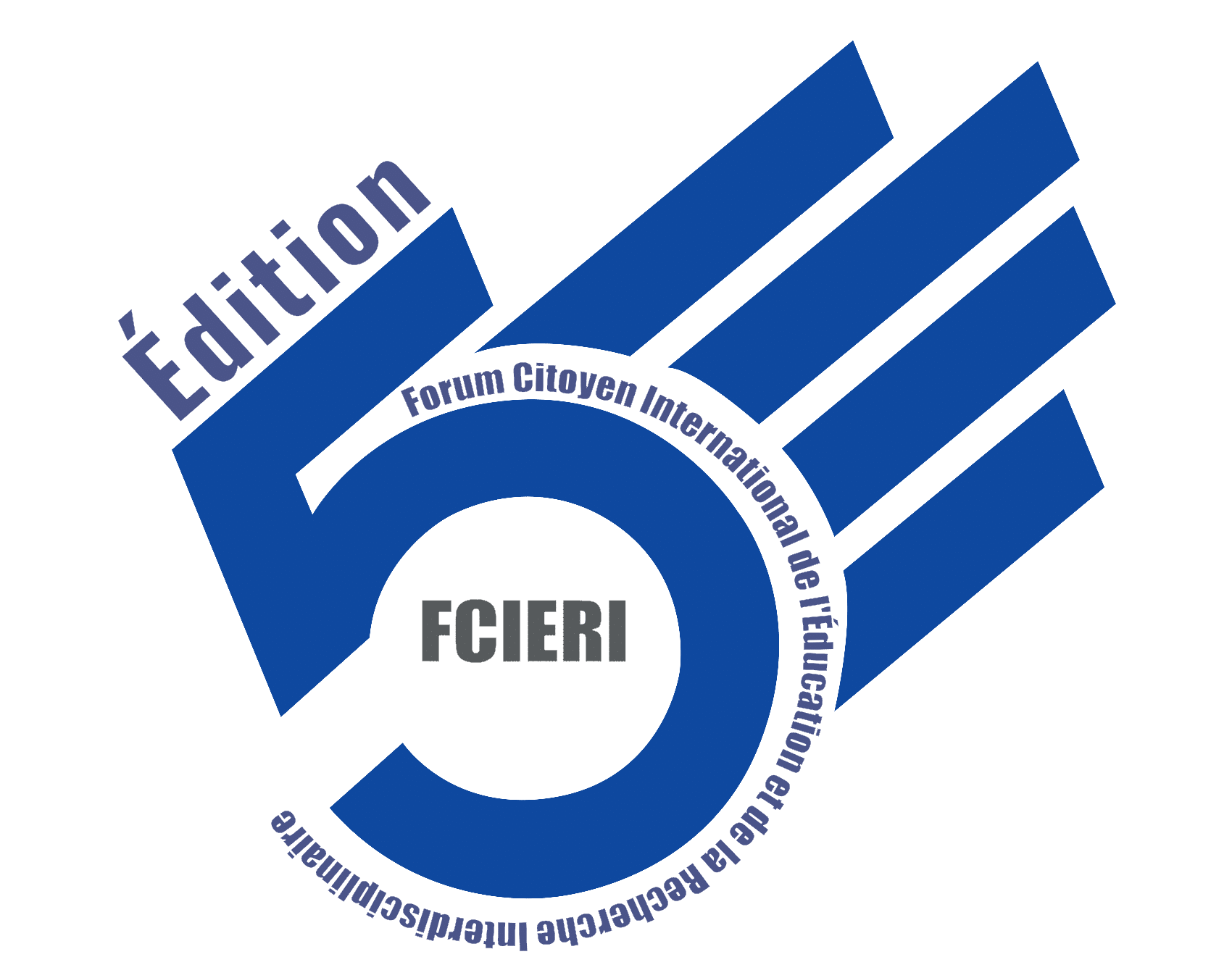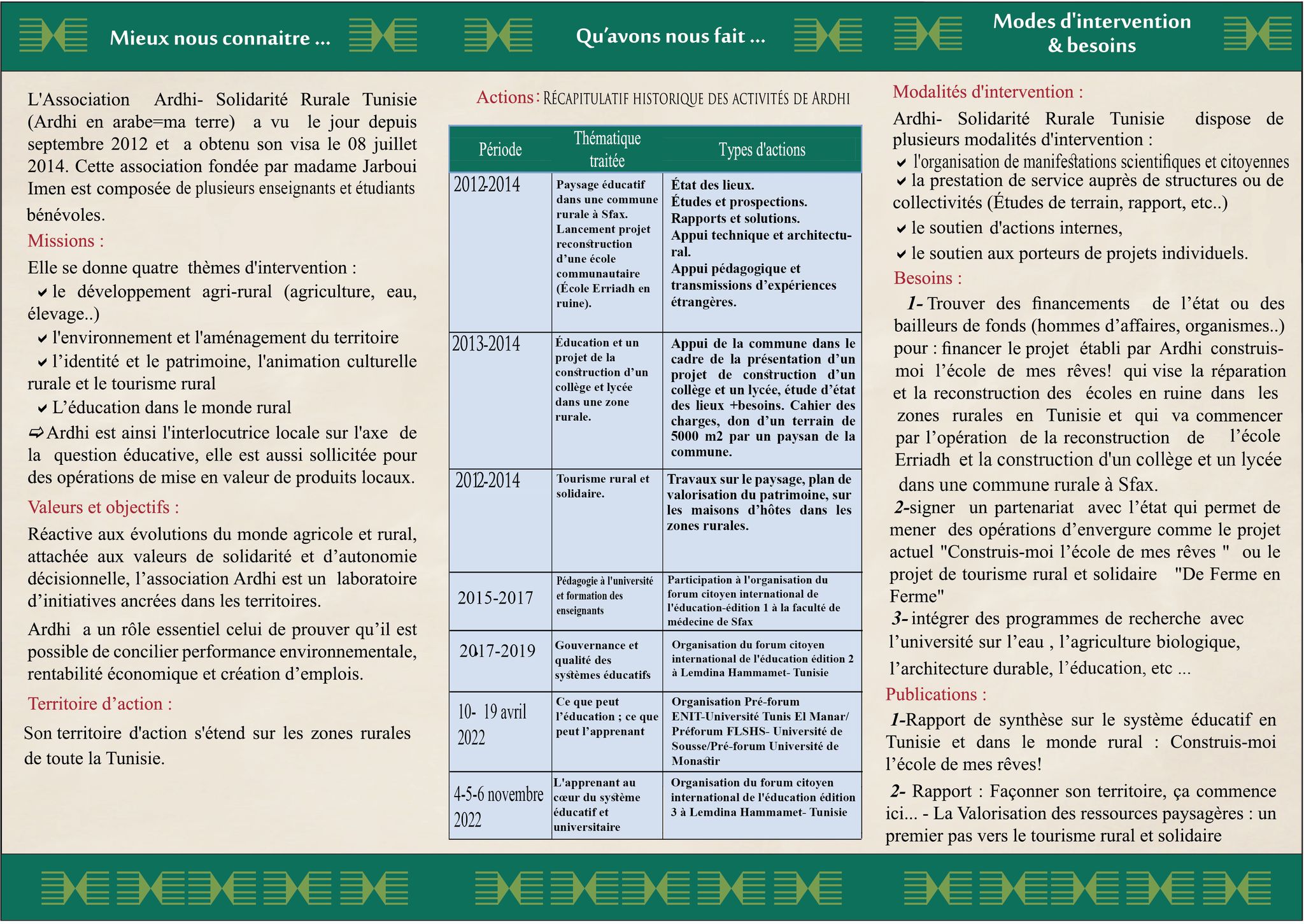Brief presentation of the Ardhi Association
The Ardhi Association (Ardhi in Arabic = my land) was created in September 2012 and obtained its visa on July 8, 2014. This association was founded by Mrs. Jarboui Imane (University of Sousse / Faculty of Letters of Sousse), Mr. Mourad Djemal (civil society activist), and Mr. Makram Hamouda (University of Tunis El Manar/Faculty of Sciences Tunis department of maths).
Missions
The initiative encompasses four main intervention themes:
1. Rural Development: Focusing on agriculture, water resources, livestock, and related areas to uplift rural communities ;
2. Environment and Land Use Planning: Addressing environmental concerns and ensuring sustainable land utilization ;
3. Identity and Heritage, Rural Cultural Animation, and Rural Tourism: Promoting the preservation of cultural heritage, fostering rural cultural activities, and encouraging rural tourism ;
4. Education in the Rural World: Ardhi plays a key role as the local interlocutor for educational matters and is also involved in initiatives to promote local products.
Values and Goals
The Ardhi association is highly responsive to the dynamic shifts occurring in the agricultural and rural domains. Driven by the principles of solidarity and decision-making autonomy, Ardhi serves as a catalyst for innovative initiatives deeply rooted in local territories.
Ardhi’s pivotal role lies in demonstrating the feasibility of harmonizing environmental sustainability, economic prosperity, and employment generation. By successfully integrating these elements, the association showcases the potential for achieving both environmental performance and economic profitability.
Territory of action
Originating in the rural region of Sfax, the scope of Ardhi's activities encompasses not only the rural areas of Sfax but extends across all regions of Tunisia.
Modalities
Ardhi adopts various modalities of intervention, which include:
Provision of Services to Structures or Communities: This involves conducting field studies, preparing reports, and offering valuable assistance to different organizations or communities ;
Internal Initiatives and Support for Project Leaders: Ardhi takes internal actions to promote its objectives and provides support to individual project leaders pursuing initiatives aligned with its mission.
Actions :
Historical summary of the activities of the FTE association
| Period | Addressed topic | Actions |
| 2012-2014 | Educational landscape of the rural commune Sidi Abdallah. Erriadh school reconstruction (in ruins). |
The current status of Ardhi’s initiatives involves the following key components: 1. Studies and Surveys: Ardhi conducts in- depth studies and surveys to assess the current state of educational facilities and infrastructure. These studies provide valuable insights into the educational landscape and help identify areas of improvement. 2. Reports and Solutions: Based on the findings from studies and surveys, Ardhi prepares comprehensive reports that highlight challenges and propose viable solutions. Thesereports serve as a foundation for implementing effective strategies. 3. Technical and Architectural Support: Ardhi offers technical and architectural assistance to ensure the construction of educational facilities that meet the required standards and best cater to the needs of students and educators. 4. Pedagogical Support and Knowledge Sharing: Ardhi provides pedagogical support to educational institutions, fostering the exchange of foreign experiences and best practices. This knowledge transfer enhances teaching methodologies and promotes innovative approaches to education. Through a holistic approach encompassing studies, reports, technical support, and pedagogical assistance, Ardhi endeavors to drive positive changes in the educational landscape, ultimately benefiting the communities it serves. |
| 2013-2014 | Education | As part of the presentation
for a college construction requirements and |
| 2012-2014 | Rural and solidarity tourism | Ardhi engages in multiple activities to achieve its goals, such as: 1. Promotion and Marketing Tools Catalog: Ardhi develops a comprehensive catalog showcasing various marketing tools to promote itsinitiatives effectively. 2. Landscape Work and Heritage Enhancement Plan: The association works on developing plans to improve landscapes and enhance cultural heritage, particularly in rural areas. 3. Support for Guest Houses in Rural Areas: Ardhi facilitates the establishment and development of guest houses in rural regions to boost local tourism. 4. Communication and Promotion: Ardhi undertakes communication and promotional activities to raise awareness about its initiatives and engage with the wider public. 5. Studies and Initiatives for Unemployed Graduates: Ardhi conducts studies to explore new professions that can address unemployment among graduates and initiates projects in this regard. 6. Sharing International Experiences: Ardhi fosters the exchange of knowledge and experiences bysharing insights from international sources to enrich its own practices and approaches. |
| 2015-2017 | Pedagogy at the university and teacher training |
Organization of the 1st edition of the International Citizen Forum for Education at the Faculty of Medicine of Sfax, Tunisia |
| 2017-2019 | Governance and quality of educational systems |
Organization of the 2 nd edition of the International Citizen Forum for Education at the Lemdina Resorts, Hammamet, Tunisia |
| 10-19 april 2022 | What education can: what
the learner can |
Organization of the Pre- forum, respectively, at the University of Tunis El Manar, the University of Sousse, and the University of Monastir |
| 4-5-6 november 2022 | The learner at the center of the education and university system |
Organization of the 3 rd edition of the International Citizen Forum for Education at the Lemdina Resorts, Hammamet, Tunisia |
| April 2024 | The challenges of teacher training and their professional integration: comparative approaches |
Organization of the 4 th edition of the International Citizen Forum for Education at the Faculty of Medicine of Sousse, Tunisia |
Needs
Ardhi has identified specific needs to further its initiatives:
Partnership with the State: Ardhi seeks to establish a formal partnership with the government to facilitate large-scale operations. This includes ongoing projects such as “Build Me the School of My Dreams" and the rural and solidarity tourism project "From Farm to Farm.” Additionally, Ardhi aims to collaborate with universities on research programs focused on water management, organic agriculture, sustainable architecture, and related fields.
Funding Acquisition: One of Ardhi’s primary requirements is to secure funding from the state or potential donors, including businesses, organizations, and individuals. This funding will support
the “Build Me the School of My Dreams" project, which aims to renovate and reconstruct schools in disrepair within rural areas of Tunisia.
By establishing a partnership with the government and securing financial support from state entities and potential donors, Ardhi endeavors to accomplish its objectives effectively, enhancing educational infrastructure and advancing sustainable initiatives in rural communities.
Publications
1. “Governance and Quality of Education Systems: Challenges and Prospects for Change”- A collective work published by Edition Apis in Quebec.
2. “Build Me the School of My Dreams!” – Summary report on the education system in Tunisia and rural areas.
3. “Shaping Your Territory, It Starts Here…” – Report on the landscape resources as a first step toward rural and solidarity tourism.
The Ardhi Team
The Ardhi team associates elected members with external volunteers, all driven by a shared vision to foster the development of our region, making it more inviting, vibrant, and progressive – a place that thrives with life!
Key members of the Ardhi Executive Office are as follows:
President: Ms. Imane Jarboui
General Secretary: Mr. Ibrahim Jrad
Treasurer: Mr. Hedi Jarboui
Assistant Treasurer: Mrs. Mariem Fourati
This dedicated team collaborates harmoniously to lead and support Ardhi's initiatives, striving to bring positive change and growth to the communities they serve.
Ardhi logo: explanatory description
Our logo beautifully encapsulates the essence of our association, Ardhi (أرضي), through Arabic calligraphy and imagery that reflects our core values and objectives of promoting sustainable rural development.
The breakdown of the logo is as follows:
The letter “أ” (alif) is ingeniously shaped as a tree, symbolizing growth and environmental harmony.
The letter “ض” (Dad) takes the form of a hill, representing the landscape and natural beauty of rural areas.
The letter “ر” (raa) creatively resembles a watercourse, highlighting the significance of water resources in our endeavors.
We have chosen two vibrant colors to further represent our mission:
Green, symbolizing lush greenery and sustainability.
Light yellow-green, reminiscent of the enchanting countryside in summer, connecting us with nature and tranquility.
Together, our logo signifies our commitment to fostering a thriving and environmentally conscious rural community, where sustainable development flourishes in harmony with the natural world.



 Le Forum mondial sur l’éducation, tenu en mai 2015 à Incheon sous l’égide de l’UNESCO et ses partenaires, s’est conclu par la Déclaration d’Incheon pour l’Éducation 2030, un engagement historique de transformer la vie grâce à une nouvelle vision de l’éducation et à des actions courageuses et innovantes pour la réaliser. Le Cadre d’action Éducation 2030, qui établit cette nouvelle vision de l’éducation pour les 15 années à venir, a été adopté par plus de 180 états membres de l’UNESCO. Quatre ans plus tard, à la 9e Réunion mondiale de la Consultation collective des ONG pour Éducation 2030 (CCONG-Éducation 2030), qui s’est tenue en Tunisie en 2019, les organisations participantes ont affirmé que le monde est confronté à une crise éducative, causée par un manque de volonté politique, une faible priorisation de l’éducation et un financement insuffisant. De plus, elles ont constaté une tendance croissante à la commercialisation de l’éducation, ce qui contribue à creuser davantage les inégalités. Les systèmes éducatifs mondiaux ne semblaient pas respecter l’engagement pris dans le programme Éducation 2030. Le ministre de l’Éducation de la Tunisie d’alors avait, à la même occasion, souligné que la plupart des pays n’avancent pas suffisamment pour atteindre les objectifs fixés pour 2030. Il a appelé à une reconnaissance de l’importance stratégique de l’éducation pour toutes les nations et a encouragé la société civile à jouer un rôle majeur dans la mobilisation pour y parvenir.
Le Forum mondial sur l’éducation, tenu en mai 2015 à Incheon sous l’égide de l’UNESCO et ses partenaires, s’est conclu par la Déclaration d’Incheon pour l’Éducation 2030, un engagement historique de transformer la vie grâce à une nouvelle vision de l’éducation et à des actions courageuses et innovantes pour la réaliser. Le Cadre d’action Éducation 2030, qui établit cette nouvelle vision de l’éducation pour les 15 années à venir, a été adopté par plus de 180 états membres de l’UNESCO. Quatre ans plus tard, à la 9e Réunion mondiale de la Consultation collective des ONG pour Éducation 2030 (CCONG-Éducation 2030), qui s’est tenue en Tunisie en 2019, les organisations participantes ont affirmé que le monde est confronté à une crise éducative, causée par un manque de volonté politique, une faible priorisation de l’éducation et un financement insuffisant. De plus, elles ont constaté une tendance croissante à la commercialisation de l’éducation, ce qui contribue à creuser davantage les inégalités. Les systèmes éducatifs mondiaux ne semblaient pas respecter l’engagement pris dans le programme Éducation 2030. Le ministre de l’Éducation de la Tunisie d’alors avait, à la même occasion, souligné que la plupart des pays n’avancent pas suffisamment pour atteindre les objectifs fixés pour 2030. Il a appelé à une reconnaissance de l’importance stratégique de l’éducation pour toutes les nations et a encouragé la société civile à jouer un rôle majeur dans la mobilisation pour y parvenir.